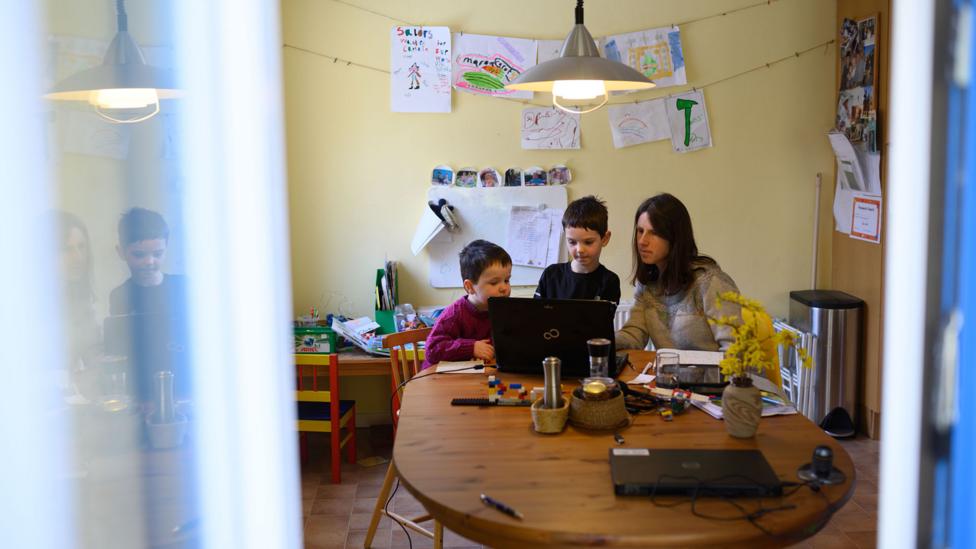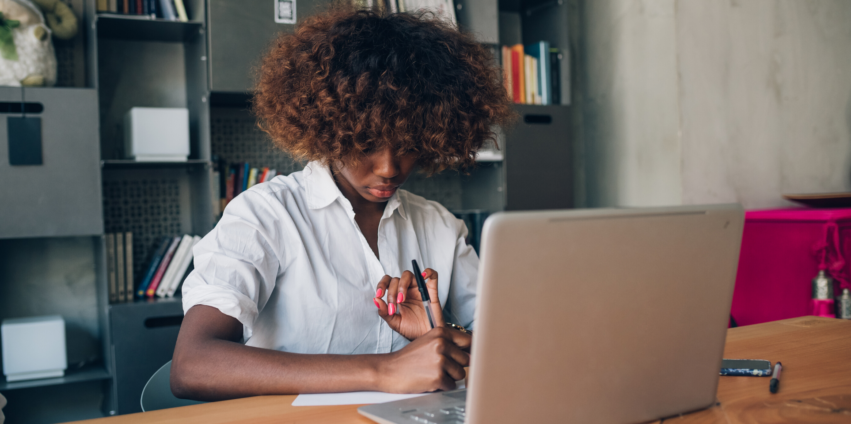urnout: the term for relentless overwork has rapidly become ubiquitous, especially when describing millennials who hustle to the point of exhaustion. And with millions of people now in lockdown as Covid-19 sweeps the globe, burnout is still very much around – but it looks a little different right now.
Many have lost jobs, while those lucky enough to keep them have to do so while working in the confines of home, some simultaneously balancing family pressing needs, like childcare. Daily life has been completely uprooted, and now, we juggle a constant onslaught of dilemmas we’ve never dealt with before: Should I disinfect my groceries? How do I stay in shape indoors? Are cardboard packages safe to touch? Can I hug my kids?
On top of it all, social media showers us with well-meaning calls to “finish up that project”: write that screenplay, build that armoire, learn Maltese! After all, according to social media, Newton discovered gravity and Shakespeare wrote King Lear when both were hunkered down to avoid the plague. Make sure your quarantine doesn’t go to waste.
In short: we’re being exhausted in a whole new way as burnout morphs during this pandemic, persisting even in the most unusual times. But it is possible to both understand why we feel this novel type of burnout – and how we keep it at bay, too.
The exhaustion of choice
Usually, when we think of burnout, we think of working 12-hour days, answering Slack messages long after we clock out and finishing a day job only to dive straight into a side hustle. But in a crisis like this, burnout can emerge because of something different – what experts call ‘decision fatigue’.
With news changing all the time, “information is constant: whether it’s about the pandemic itself, whether it’s about things you should be doing, schedules for your kids, how to work best from home – it’s just a lot of information”, says Janna Koretz, a Boston-based psychologist who helps clients with high-powered jobs navigate burnout.
In other words, the Covid-19 pandemic is forcing us to rapidly grapple with difficult decisions in an unsettlingly new context.
“Normally, we’re not thinking about the ethical implications of ordering delivery or whether to offer to get groceries for your elderly neighbour,” says Elizabeth Yuko, a New York-based journalist and Fordham University adjunct professor in bioethics, the field that studies ethical implications in healthcare, medicine and other areas of life science. “It’s this psychological stress most of us aren’t used to. We’ve never experienced anything like this in modern times.”
On an hourly basis, our top concerns can swing from how we keep our families safe to what the kids are going to eat for dinner. “You have these range of decisions that go from borderline life-or-death on one end of the spectrum – and then snacks on the other,” Yuko says.
“People are still trying to figure out how to exist in this new world,” adds Koretz. Figuring out how to structure your day or prioritise tasks now seems herculean, especially when your home, once your sanctuary, now potentially triples as an office, school and quasi-prison.
This decision fatigue, combined with the pressure we’re putting on ourselves to make smart, safe choices for ourselves, our families and our communities, can lead to pandemic-specific burnout.
The stress of unwinding
Experiencing some emotional exhaustion and anxiety is to be expected, the experts agree. The problem is that many of our usual coping mechanisms have vanished – think going to the gym or taking an art class – and trying to shoehorn in a new one might actually exacerbate burnout.
Those tweets urging people to either start or finish that passion project can be a source of stress for some, who already feel frenzied that they’re not spending their time correctly. It can lead to even more stress for people worrying they’re not using every moment to be productive – like finishing a project or learning a new skill – especially as we’re all trying to figure out the best way to cope with our new reality.
Lotte Dyrbye, a doctor at the Mayo Clinic, one of the largest medical research institutions in the US, researches burnout and the wellbeing of physicians. She says people need to find things that work for them, whether it’s meditation, solitary walks or bingeing on Netflix. “It really needs to be very individualised, and there’s not necessarily a right or wrong.” Don’t pile onto your anxiety: rely on hobbies you already have; ones you know make you happy and take the stress off. A big part of staving off pandemic-induced burnout is that the activity shouldn’t feel exhausting.
“People feeling anxious about writing their next novel, or learning how to play the guitar, or learning French – I’ve gotten questions about that a lot; people saying, ‘I feel like a failure, I finally have this time’,” says Yuko. It’s unrealistic to expect to perform above and beyond right now, even with an abundance of time at home. “This is probably the biggest shift in all of our lives in terms of day-to-day operations,” she says.
Take care to stay sane before panicking about the progress of your masterpiece-in-progress – or lack thereof.
It’s not forever
Koretz says clients have been raising a host of new concerns associated with the pandemic: financial fears, job losses, concerns about older parents, disappointment over cancelled trips. She says that there’s a lot of pressure to still perform well at your job (if you still have one), and to meet all the new demands at once, which can cause burnout.
Her advice? Keep the big picture in mind. “This all is a season. This will pass. It may be difficult… there’s a lot of scary things between point A and point B,” she says. “But point B exists. And every day that we’re in quarantine, we’re closer to that time.”

There’s even a potential silver lining – you may hone some key life skills.
Koretz says that, usually, burnout is caused by unrealistic expectations, either from our employer or from ourselves. But coming out of the pandemic may shift our perspectives, after weeks of learning to adjust to new circumstances like widespread remote work. “This is going to make everybody’s ability to manage, cope and be flexible much better. So when we go back to our day-to-day, things are going to be easier because we’ve done something that’s very challenging,” she says.
When in doubt, Yuko says, stick to the basics. With each decision you make during this time that stokes anxiety, make a simple list of pros and cons. What are the risks associated with each option? But perhaps the best thing you can do right now – in the age of social distancing – is the exact opposite of the urge driving the behaviour that leads to burnout in the first place. Do nothing.
“By staying in our houses, apartments, et cetera – that itself is doing something positive, and really the best thing we can do right now,” says Yuko. “By doing nothing, you’re doing something.”
Latest Stories
-
Guinea’s ex-military ruler pardoned over stadium massacre
25 minutes -
Foster confirmation of MMDCEs – V/Regional Minister appeals to chiefs
36 minutes -
Sale of diplomatic properties in Nigeria, Zambia by previous administration cancelled – Ablakwa
1 hour -
Maternal and newborn health crisis worsens as late referrals surge
2 hours -
Farmer fined GH₵4,800 for stealing 5 sacks of ginger
2 hours -
Playback: The Law discussed Article 146 – prima facie
3 hours -
Appeal Court judge slams weak enforcement of Land Act as land disputes dominate court cases
4 hours -
Police arrest two suspects for robbery at Ashaiman
4 hours -
Fire ravages apartments, stores at Akyem Kwabeng
4 hours -
Tano Anwia’s concession owner teams up with Forestry Commission to combat galamsey
5 hours -
Gov’t allocates GH₵490m to Education Ministry
5 hours -
Tragedy: Nigerian boxer dies after Ghana Pro League bout
5 hours -
Opoku-Agyemang undergoes treatment at UGMC, set to receive further care abroad
8 hours -
The mystery of Bomigo: an island of divine laws, sacred goats, and unwavering traditions
10 hours -
Government’s GH₵ 292.4 million mistake: why free sanitary pads are the problem, not the solution
10 hours

